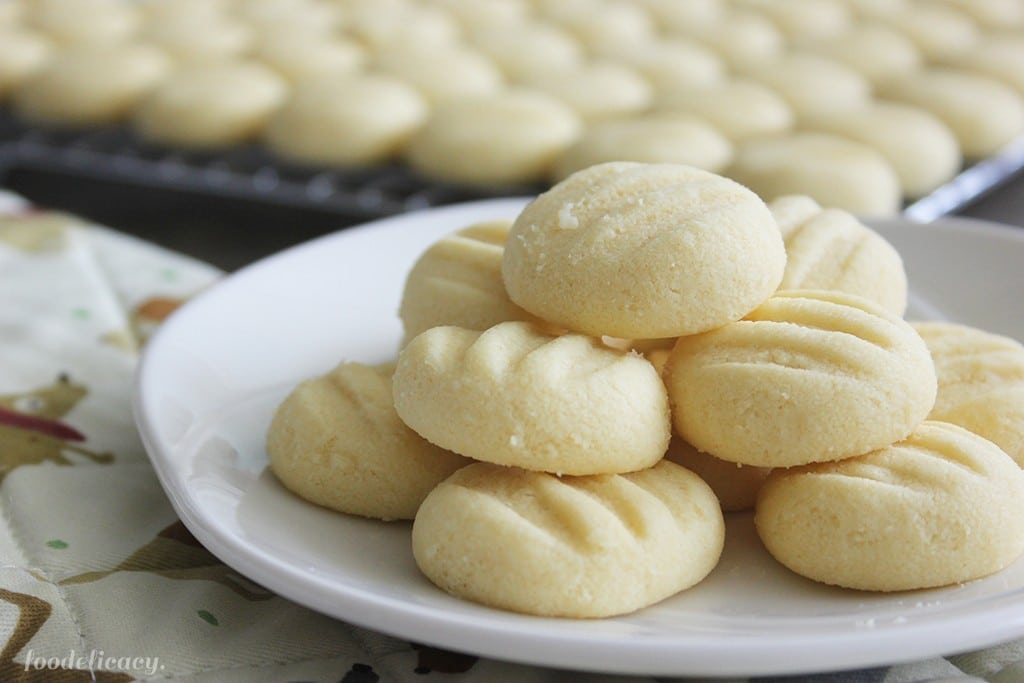Sugee Cookies – Makes Melt-in-Your-Mouth Magic!
I can’t possibly start my Lunar New Year without sugee cookies!
My festive baking this year has seen better progress than most, with lapis cakes and pineapple tarts all done, and now, with just three more days to the start of the New Year, I quickly get to baking these light, crumbly, and oh-so-very-buttery ghee cookies.
Sugee cookies are like a very lightweight version of shortbread cookies.
Biting into a sugee cookie, you first feel a crisp crunch, and the cookie quickly breaks into crumbly morsels, releasing an intense buttery flavour (as ghee is used instead of butter), and it all literally melts in your mouth.

It’s a sublime way to enjoy a cookie, don’t you agree?
Sugee cookies are very easy to bake (yes, believe me – finally, here’s a Chinese New Year goodie that doesn’t have to test our baking skills to the hilt!).
These cookies tend to have characteristic cracks in their appearance, and that’s due to the action of baking soda when mixed into the cookie dough.

I tend to defer to traditional Nonya recipes like this one by the late Mrs Leong Yee Soo, which uses the simplest of ingredients, and omits the use of baking soda.
If you love surface cracks in your sugee cookies, mix in 2 to 2 1/2 tsp of baking soda with the flour, before adding to the ghee mixture. Then proceed as per the recipe instructions, and shape into rounds without making impressions.

DID YOU KNOW?
Ghee is clarified butter — the butter oil, without the lactose and other milk solids. It is traditionally prepared by gently heating butter until it becomes a clear golden liquid.
The lactose and other milk solids coagulate and are meticulously removed. This process also evaporates most of the natural water content, making ghee light, pure and resistant to spoilage (source: www.qbbghee.com).

Perhaps, the only challenge you’re likely to face is the temptation to over-bake these cookies, and trust me, it’s easy to over-bake these.
You’ll tend to want to see the cookies brown a little, as most cookies and biscuits do, but these cookies should turn lighter, to a pale cream colour when baked (and I know that this might go against every impulse or instinct you have as a baker).

If they are over-baked, these cookies become hard, crispy and crunchy, though still delicious, and are perfectly edible.
If baked to a pale cream, these cookies will give you that full buttery taste of ghee, and that much sought after, characteristic, melt-in-your mouth texture.

Ingredients
- 400 g ghee
- 300 g confectioner’s sugar
- 700 g plain flour
- 1 tsp vanilla essence
- ¾ tsp salt
Instructions
- In an electric mixer fitted with a paddle attachment, cream ghee confectioner’s (icing) sugar, essence, and salt on medium speed for 5 minutes. Change to a dough hook attachment, add the flour, and knead into a soft dough. Leave covered for 4 hours.
- Pre-heat oven to 120 deg C (250 deg F). Line baking trays with greaseproof paper.
- Using a teaspoon, scoop a heaped teaspoon portion of dough and roll between your palms into a ball, each the size of a marble. Place on the baking tray, spaced well apart. Using a small fork, make impressions by pressing lightly on the centre of each ball, and sliding the fork away from the centre to prevent sticking. (For round-shaped cookies, roll into balls, and press lightly in the centre with your finger).
- Bake for 20 – 25 minutes, until cookies turn lighter in colour. Transfer to a cooling rack. When completely cooled, store in airtight containers.





